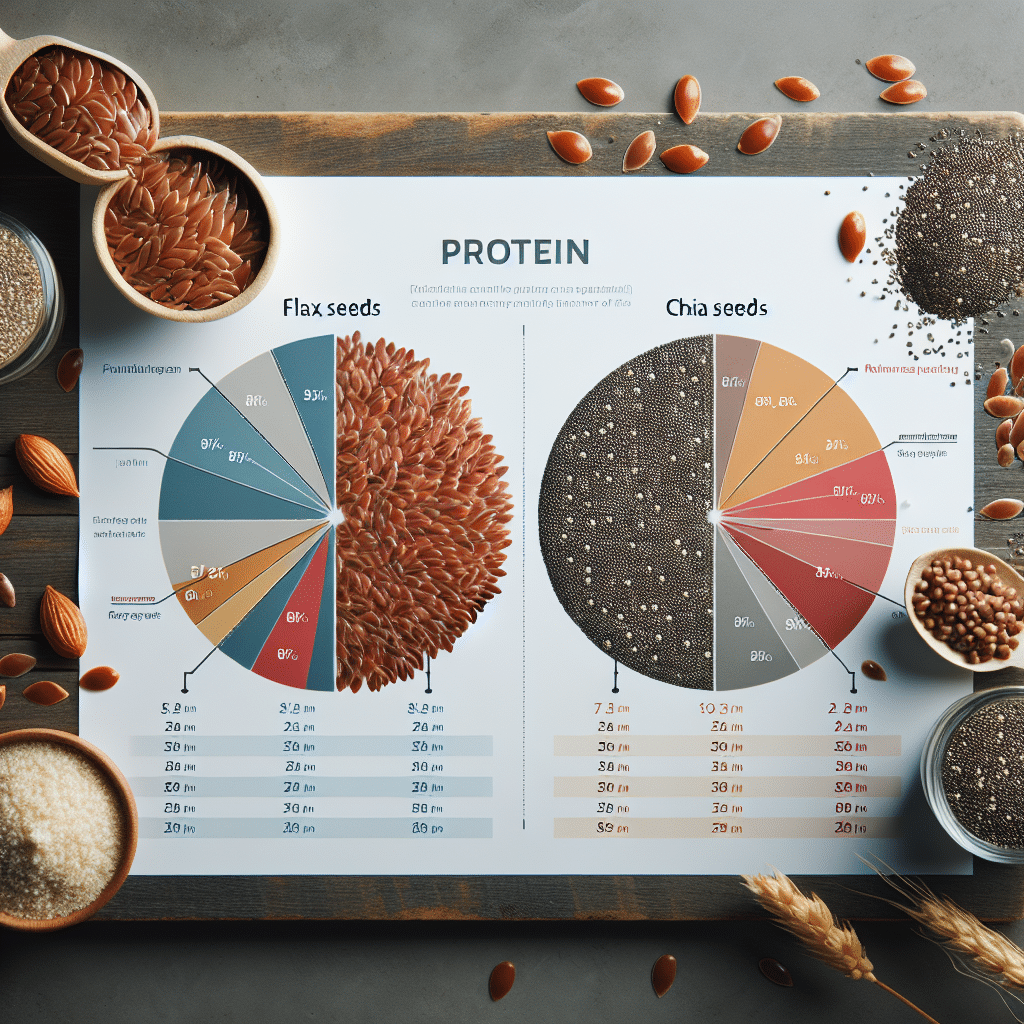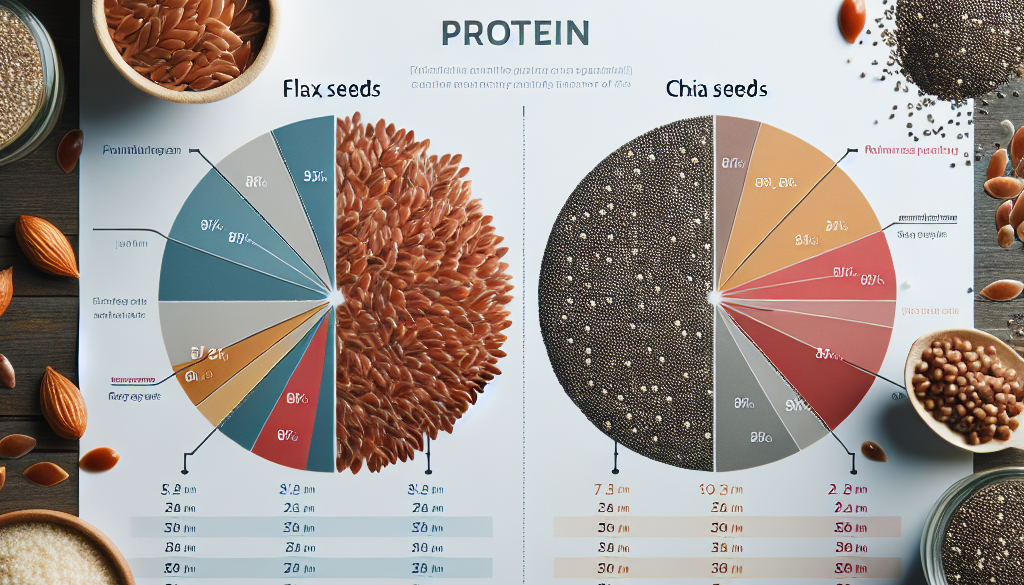Are Flax Seeds Better Than Chia Seeds For Protein?
-
Table of Contents
- Flax Seeds vs. Chia Seeds: Which Reigns Supreme for Protein?
- Nutritional Overview of Flax Seeds and Chia Seeds
- Protein Quality and Digestibility
- Health Benefits Beyond Protein
- Practical Considerations in Diet
- Conclusion: Weighing the Protein and Overall Benefits
- Discover ETprotein’s High-Quality Protein Products
Flax Seeds vs. Chia Seeds: Which Reigns Supreme for Protein?

When it comes to plant-based sources of protein, seeds are often a go-to option. Among the plethora of seeds available, flax seeds and chia seeds have gained popularity not only for their protein content but also for their overall nutritional benefits. However, the question remains: are flax seeds better than chia seeds for protein? This article delves into the nutritional profiles of both seeds, compares their protein content, and examines other health benefits to determine which seed might be the superior choice for those looking to boost their protein intake.
Nutritional Overview of Flax Seeds and Chia Seeds
Before we can compare the protein content of flax seeds and chia seeds, it’s essential to understand their overall nutritional makeup. Both seeds are known for being high in fiber, omega-3 fatty acids, and various vitamins and minerals. Here’s a quick breakdown of their nutritional profiles per 100 grams:
- Flax Seeds: Approximately 18g of protein, 42g of fat (of which 22g is omega-3 fatty acids), 28g of fiber, and rich in vitamins B1, B6, and minerals like magnesium, phosphorus, and potassium.
- Chia Seeds: Roughly 17g of protein, 31g of fat (of which 18g is omega-3 fatty acids), 34g of fiber, and a good source of calcium, phosphorus, and manganese.
While both seeds are similar in terms of protein content, flax seeds have a slight edge. However, the difference is minimal, and both seeds can be considered excellent sources of plant-based protein.
Protein Quality and Digestibility
When assessing the quality of protein in foods, it’s crucial to consider the amino acid profile and the digestibility of the protein. Amino acids are the building blocks of protein, and there are nine essential amino acids that the body cannot produce on its own. A complete protein source contains all nine essential amino acids in sufficient quantities.
Both flax seeds and chia seeds contain all nine essential amino acids, making them complete protein sources. However, the ratio of these amino acids varies, and neither seed perfectly matches the human body’s requirements. Additionally, the protein digestibility of seeds can be affected by their fiber content, which can bind to protein and other nutrients, making them less available for absorption.
Health Benefits Beyond Protein
While protein content is an important factor, it’s not the only one to consider when choosing between flax seeds and chia seeds. Both seeds offer a range of health benefits that go beyond their protein content:
- Omega-3 Fatty Acids: Both seeds are excellent sources of alpha-linolenic acid (ALA), a type of omega-3 fatty acid that is beneficial for heart health.
- Fiber: The high fiber content in both seeds can aid in digestion, help maintain bowel health, and promote a feeling of fullness, which can be beneficial for weight management.
- Antioxidants: Flax seeds and chia seeds contain antioxidants that help protect the body from free radicals and reduce inflammation.
It’s also worth noting that flax seeds need to be ground to access their full nutritional benefits, as whole flax seeds can pass through the digestive system undigested. Chia seeds, on the other hand, can be consumed whole or ground.
Practical Considerations in Diet
When incorporating these seeds into your diet, consider your personal preferences and dietary needs. Flax seeds have a nutty flavor and are often used in baking, while chia seeds have a more neutral taste and can be used to thicken smoothies or make chia pudding.
Both seeds are versatile and can be added to a variety of dishes, including:
- Yogurt and oatmeal
- Salads and soups
- Homemade bread and muffins
- Energy bars and granola
Ultimately, the choice between flax seeds and chia seeds may come down to personal preference and how you plan to use them in your meals.
Conclusion: Weighing the Protein and Overall Benefits
In conclusion, while flax seeds contain slightly more protein than chia seeds, the difference is marginal. Both seeds offer a complete protein source and a host of other nutritional benefits, including fiber, omega-3 fatty acids, and antioxidants. The decision to choose one over the other should be based on individual dietary goals, taste preferences, and how you intend to incorporate them into your diet.
For those looking to increase their protein intake with seeds, it’s advisable to include a variety of protein sources to ensure a balanced intake of all essential amino acids. Both flax seeds and chia seeds can be part of a healthy, protein-rich diet when combined with other protein sources such as legumes, nuts, and whole grains.
Discover ETprotein’s High-Quality Protein Products
If you’re seeking additional plant-based protein options, consider exploring ETprotein’s range of organic bulk vegan proteins. ETprotein offers a variety of protein products, including organic rice protein, pea protein, and seed-based proteins like watermelon, pumpkin, and sunflower seed protein. Their products are characterized by a neutral taste, non-GMO, and allergen-free attributes, making them an excellent choice for those looking to diversify their protein sources.
ETprotein’s commitment to quality and purity, with L-(+)-Ergothioneine purity over 98%, ensures that you’re getting the best possible ingredients for your nutritional needs. Whether you’re involved in sports nutrition, weight management, or general health and wellness, ETprotein has a protein solution to support your goals.
Contact ETprotein today to sample their high-quality protein products and take the next step in optimizing your diet with plant-based proteins.
About ETprotein:
ETprotein, a reputable protein and L-(+)-Ergothioneine (EGT) Chinese factory manufacturer and supplier, is renowned for producing, stocking, exporting, and delivering the highest quality organic bulk vegan proteins and L-(+)-Ergothioneine. They include Organic rice protein, clear rice protein, pea protein, clear pea protein, watermelon seed protein, pumpkin seed protein, sunflower seed protein, mung bean protein, peanut protein, and L-(+)-Ergothioneine EGT Pharmaceutical grade, L-(+)-Ergothioneine EGT food grade, L-(+)-Ergothioneine EGT cosmetic grade, L-(+)-Ergothioneine EGT reference grade and L-(+)-Ergothioneine EGT standard. Their offerings, characterized by a neutral taste, non-GMO, allergen-free attributes, with L-(+)-Ergothioneine purity over 98%, 99%, cater to a diverse range of industries. They serve nutraceutical, pharmaceutical, cosmeceutical, veterinary, as well as food and beverage finished product distributors, traders, and manufacturers across Europe, USA, Canada, Australia, Thailand, Japan, Korea, Brazil, and Chile, among others.
ETprotein specialization includes exporting and delivering tailor-made protein powder and finished nutritional supplements. Their extensive product range covers sectors like Food and Beverage, Sports Nutrition, Weight Management, Dietary Supplements, Health and Wellness Products, and Infant Formula, ensuring comprehensive solutions to meet all your protein needs.
As a trusted company by leading global food and beverage brands and Fortune 500 companies, ETprotein reinforces China’s reputation in the global arena. For more information or to sample their products, please contact them and email sales(at)ETprotein.com today.












